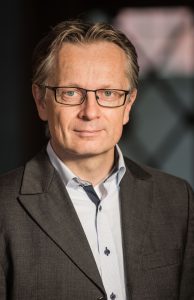HITS group leader Volker Springel will become Max Planck Director in Summer 2018
Volker Springel, head of the Theoretical Astrophysics group (TAP) at the Heidelberg Institute for Theoretical Studies (HITS), accepted the offer to become director of the Max Planck Institute for Astrophysics (MPA) in Garching near Munich. He will start his new position in August 2018. HITS congratulates him on this career step: “Our concept bears fruit to provide brilliant young researchers with an environment to become even better and move on.”
“This is a big success for Volker, but also for HITS as a research institute”, says Michael Strube, HITS´ Scientific Director. “To become director of a Max Planck Institute is the most prestigious position for a scientist in Germany. Even internationally it cannot get much better.”
To coordinate the change between Heidelberg and Garching, Volker Springel has received a partial appointment at the MPA since October 1, 2017. He and his group will continue to pursue their research at HITS until the end of July 2018.
The astrophysicist Prof. Volker Springel has designed and carried out the largest and most comprehensive computer simulations of the universe, including the Millennium Simulation in 2005, and the “Illustris” simulation, which is the most detailed computer simulation of galaxy formation and was published in the journal “Nature” in 2014.
He has been leader of the “Theoretical Astrophysics” research group at HITS since March 2010, and at the same time being professor of Theoretical Astrophysics at Heidelberg University. At HITS, he developed the “Arepo” software which enabled scientists to simulate a wide range of galaxy shapes and sizes with supercomputers.
“I was taking a risk when I moved to the then new, still unknown HITS in March 2010”, Volker Springel says. “But it was really worth it. The offer to become Max Planck director is a great proof of quality also for HITS. If you do research here, you will be able to take even bigger steps in your scientific career.”
HITS congratulates Volker Springel to this achievement. “We are happy to see that our concept bears fruit”, says Michael Strube. “One of HITS’ goals has always been to attract brilliant young scientists, to provide them with an environment to become even better, and then let them move on.”
See also the press release of the Max Planck Institute for Astrophysics.
About HITS
HITS, the Heidelberg Institute for Theoretical Studies, was established in 2010 by physicist and SAP co-founder Klaus Tschira (1940-2015) and the Klaus Tschira Foundation as a private, non-profit research institute. HITS conducts basic research in the natural, mathematical, and computer sciences. Major research directions include complex simulations across scales, making sense of data, and enabling science via computational research. Application areas range from molecular biology to astrophysics. An essential characteristic of the Institute is interdisciplinarity, implemented in numerous cross-group and cross-disciplinary projects. The base funding of HITS is provided by the Klaus Tschira Foundation.
